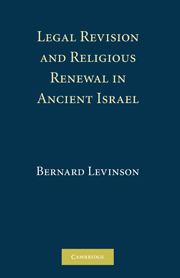Book contents
- Frontmatter
- Contents
- List of Figures
- Foreword, by Jean Louis Ska
- Preface
- Abbreviations
- 1 Biblical Studies as the Meeting Point of the Humanities
- 2 Rethinking the Relation between “Canon” and “Exegesis”
- 3 The Problem of Innovation within the Formative Canon
- 4 The Reworking of the Principle of Transgenerational Punishment: Four Case Studies
- 5 The Canon as Sponsor of Innovation
- 6 The Phenomenon of Rewriting within the Hebrew Bible: A Bibliographic Essay on Inner-Biblical Exegesis in the History of Scholarship
- Author Index
- Subject Index
- Index of Scriptural and Other Sources
1 - Biblical Studies as the Meeting Point of the Humanities
Published online by Cambridge University Press: 18 August 2009
- Frontmatter
- Contents
- List of Figures
- Foreword, by Jean Louis Ska
- Preface
- Abbreviations
- 1 Biblical Studies as the Meeting Point of the Humanities
- 2 Rethinking the Relation between “Canon” and “Exegesis”
- 3 The Problem of Innovation within the Formative Canon
- 4 The Reworking of the Principle of Transgenerational Punishment: Four Case Studies
- 5 The Canon as Sponsor of Innovation
- 6 The Phenomenon of Rewriting within the Hebrew Bible: A Bibliographic Essay on Inner-Biblical Exegesis in the History of Scholarship
- Author Index
- Subject Index
- Index of Scriptural and Other Sources
Summary
The ideal does not always translate into the real. Just at the point where the speaker of Deuteronomy begins to propound a utopian program to eliminate poverty—“There shall be no one in need among you!” (Deut 15:4)—he quickly pulls himself back to earth to confront the gap between vision and reality: “If there is one in need among you…” (Deut 15:7). Utopian vision and pragmatic preparation are here separated only by a single word, since the Hebrew phrases involved are otherwise identical. The same particle that adds declamatory force to the initial assertion (יכ) is also the one that forms the later conditional statement. As with the ancient text, so with contemporary scholarship: the dividing line between utopian vision and pragmatic reality hinges on a single word. In an ideal world, the concept of canon might provide a meeting point for the humanities. It would offer a bridge between the multiple, separate disciplines that operate, more or less explicitly, with canonical collections of texts and even canonical methods of research. The reality, however, is that, even as the separate disciplines actively reassess their canons—the intellectual and historical forces that defined their canons, the ideologies and biases encoded in those canons, the degree of adaptability of those canons, and the extent to which their canons promote or inhibit cultural change and intellectual renewal—there is a striking absence of dialogue between disciplines on the canon as the common point of ferment.
- Type
- Chapter
- Information
- Publisher: Cambridge University PressPrint publication year: 2008



